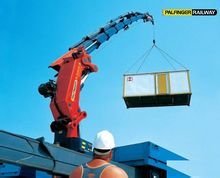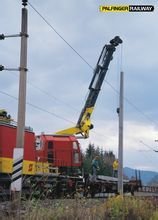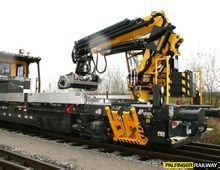Palfinger Railway
帕尔菲格铁路设备,在全世界范围内的铁路领域提供的专业液压起重、装载、搬运设备,是业内专家,并且是世界领先的铁路设备制造商。提供专业的铁路吊机、高空接触网作业用抬拨线装置、桥梁检测装置,和铁路高空作业平台。其产品以折叠臂起重机为主,也有直臂产品,折叠臂铁路设备是其特色和优势。其产品以高效和安全闻名,在欧洲及美洲地区被广泛应用,在世界铁路领域也以其产品的质量和高科技特性而声名卓著。
Palfinger Railway基本信息
| 中文名称 | 帕尔菲格铁路设备 | 外文名称 | Palfinger Railway |
|---|---|---|---|
| 专业操纵系统 | Paltronic系统 | 特 色 | 操控准确而简易。 |

Palfinger Railway产品系列
PK系列
是Palfinger产品中被最广泛使用的产品,和多功能吊具结合实现不同的作业需要。起重能力从5mt到150mt。
PKR系列
特特别适于接触网下的作业。起重能力从2.7mt到150mt。
PR系列
可自由在有限的空间内工作,如限界范围内。工作时不影响邻线两边车辆的正常行驶。
PA系列
载重可达1000kg。图示作业机构为一整体铁路系统解决方案。特别适用于紧急情况时的快速维护。多个作业机构安装于一台车上,可同时并行作业。
桥梁检测装置
线路上和和线路下均有宽广的作业范围,良好的安全性和舒适性。在工作篮上装备有电动、液压、气动源,用来拆除一些部件和进行维修工作。有PA19000系列和PB4系列两种桥检设备。PB4是目前世界上最大的吊篮式或称为折臂式桥梁检测设备。
帕尔菲格铁路设备(Palfinger Railway)正在开发用于高速铁路桥梁的可连续检测的高效桥梁检测装置,通过一个基本结构可以实现完全不同的工作。 增加旋转支臂在接触网间提升整个机构;支臂机构可跨越接触网和立杆的障碍;无需移除立杆,独一无二的动力学结构可实现连续检测作业。
PFD系列
作业特点是,接触电缆和承力索的定位装置,更换绝缘子和支架时效率高,而且不影响接触网张力和位置精度。在运行时占用很小的空间。
多功能吊具
繁忙线路需要经常性的大修和维护。使用多功能和高效的维修车辆可以更加有效的处理建材和重型设备的作业。Palfinger Railway提供的多功能吊具和附件扩大了施工车辆的功能和使用范围。这样可以提高施工的机械化程度,对有成本压力和施工人员短缺的单位,尤其适用。
- 工作篮
- 地钻
- 多功能联接器
- 卷扬机 (Winches)
- 吊钩
- 伐木装置
- 多片抓钩
Palfinger Railway造价信息
通过Paltronic操控系统实现对设备功能的控制和监控控制车辆走行功能
舒适及安全
- 半自动返回静位/运输位置
- 故障信息存储及显示
- 防撞保护
快速完成作业
比如,作业篮在所有幅度保持同速
防脱轨保护
- 防脱轨安全功能根据欧标EN 14033
安全保护
- 稳定性
- 过载安全性
帕尔菲格铁路设备,在全世界范围内的铁路领域提供的专业液压起重、装载、搬运设备,是业内专家,并且是世界领先的铁路设备制造商。提供专业的铁路吊机、高空接触网作业用抬拨线装置、桥梁检测装置,和铁路高空作业平台。其产品以折叠臂起重机为主,也有直臂产品,折叠臂铁路设备是其特色和优势。其产品以高效和安全闻名,在欧洲及美洲地区被广泛应用,在世界铁路领域也以其产品的质量和高科技特性而声名卓著。
Palfinger Railway设备的特点是具有统一的接口,不同规格的吊机和平台,拥有同一规格和标准的接口与车辆对接。这样可以解决许多特殊个案,而无需增加额外的技术和费用。帕尔菲格铁路设备经过精心设计,适用于铁路的各种工况使用。通过与车辆制造厂家的紧密合作和协调,生产出合适的产品,最关键的是保留了车辆的特性而不需要做任何改造。
Palfinger Railway独有的专业操纵系统Paltronic系统是帕尔菲格高科技应用之一,保证作业人员对设备的操控准确而简易。
Palfinger Railway常见问题
- 针对不同车辆进行设计
- 降低结构高度
- 几种产品组合提供量身定制的解决方案
运行在德国联邦铁路线上的所有接触网综合维修车上使用的三个关键作业机构:PA360(带工作篮),PA95(带升降工作平台)和PFD99抬拨线装置,均为Palfinger Railway的产品。
Part Ⅰ Railway Environment and Safety
Part Ⅱ Railway Engineering
Part Ⅲ Electrified Railway
Part Ⅳ Vehicle Engineering
Part Ⅴ Transportation Planning and Operation
Part Ⅵ Transportation and Economy 2100433B
Since the issuance of Fundamental Code for Design on RaiLway Bridge and Culvert (TB 10002. 1-2005) , China has made remarkable achievements in railway construction, in particular high-speed railway ( HSR) . High-speed railways like Beijing-Shanghai HSR, Beijing-Guangzhou HSR,Zhengzhou-Xi'an HSR and Harbin-Dalian HSR,mixed passenger and freight railways like Yichang-Wanzhou Railway and Taiyuan-Zhongwei-Yinchuan Railway, heavy-haul railways like Central and Southern Shanxi Railway and Mengxi-Huazhong Railway, intercity railways like the Pearl River Delta Intercity Railway and Wuhan Metropolitan Circle Intercity Railway have been completed and opened to traffic,improving the railway network structure and increasing the effective supply of railway transportation services. After more than ten years of exploration and innovation, China has made a historic breakthrough and achieved a momentous leap in the construction technology of railway bridges, reaching the world's high level. A number of deep-water and long-span bridges,complex bridges,and bridges in special geological conditions,such as Nanjing Dashengguan Yangtze River Bridge and Wuhan Tianxingzhou Yangtze River Bridge,have been completed successfully and the complete sets of large-tonnage box beam technology researched and developed independently by China have been widely used9 accumulating rich experience and laying a solid foundation for further improving the technical standards of railway bridge.
This Code is prepared according to the requirements of establishing the railway engineering and construction standard system of National Railway Administration and based on the revision of Fundamental Code for Design of Railway Bridge and Culvert (TB 10002.1-2005), by summarizing the experience and scientific research results in the construction and operation of bridges and culverts of Fugh-speed railways, interaty railways,mixed passenger and freight railways and heavy-haul railways in China, with a view to meeting the demand for the construction and development,unifying the design standards,improving the design level and ensuring the safety and quality of railway bridges and culverts.
In this Code, the principleof safety first is implemented and the technical requirements for quality safety, resource conservation9 environmental protection, risk prevention, and disaster prevention and mitigation are strengthened.The main design criteria for railway bridges for different services and different speed levels are determined rationally in consideration of the national situation, the economic and social development level and environmental conditions of China,further improving the scientificity and technical and economic rationality in terms of bridge and culvert design.
This Code consists of 5 chapters,namely General Provisions,Terms and Symbols,Layout of Bridge and Culvert,Design Loads and Design of Bridge and Culvert,and 5 appendices.
This Code is prepared on the basis of Code for Design on Subgrade o f RaiLway (TB 10001-2005) as per the requirements of National Railway Administration to establish a standard systemfor railway engineering and construction by summing up experience and research results in recent years on earthworks construction and operation of high-speed railway, intercity railway, mixed passenger and freight railway and heavy-haul railway.lt is a comprehensively revised edition to meet the needs for earthworks construction and development,to unify the design standard and improve the design level of railway earthworks,and to ensure the safety and quality of railway earthworks after learning from relevant standards of China and other countries and soliciting opinions on a wide basis.
rrhis Code prioritizes safe operation and emphasizes the technical requirements regarding construction quality, resource saving, environmental protection and disaster prevention and mitigation in view of China- s present conditions9 and economic and social development.lt also specifies the main design criteria of railway earthworks based on different types of traffic and different grades of speed,making this Code more scientific and rational regarding technology and cost efficiency.
- 相关百科
- 相关知识
- 相关专栏
- 拖拉机标准汇编
- 精干燥器
- 电气集中故障处理
- 软硬联接
- 美国C-MAG弹匣
- 高等教育精品教材:机械工程基础
- 力矩联接器
- 美孚600W超级汽缸油
- 农业拖拉机和机械电力传输联接器
- 南斯拉夫FAP3232BDST/AV(8*8)牵引车
- 聚信盒子
- 盾构机械连接器
- 安澳钢板网机器制造
- 抛弃型高效过滤箱
- 船舶动力装置安装工艺-船舶动力专业
- 远创钢板网
- 基于压电堆驱动器的喷嘴挡板式气体控制阀
- 电气工程及其自动化特色专业建设探索
- 分形DGS单元结构设计及其在微带电路中的应用
- 磷铵技术改造五大磷肥工程的建议
- 以大豆油多元醇制备的硬质聚氨酯泡沫塑料的性能
- 逆变TIG焊机接触引弧电路的设计(引弧电路)
- 预制砌块(砖、石)挡土墙工程砌体施工安全技术交底
- 应用模糊数学理论对公路工程建设项目方案的综合评价
- 引嫩工程扩建区土壤水盐动态与防治土壤盐碱措施
- 中华华丹雨、污水管道沟槽开挖专项施工方案教学教材
- 中国工程图学学会成立工程与制造系统集成化分会
- 中国吹制玻璃行业市场前景分析预测年度报告(目录)
- 可替代现有隔热保温材料的新型材料
- 医院病房楼工程施工装饰装修工程施工控制
- 在生活中构筑自然——河南天旺园林工程有限公司剪影
- 中国机械工程学会授予材料热处理工程师资格人员名单


